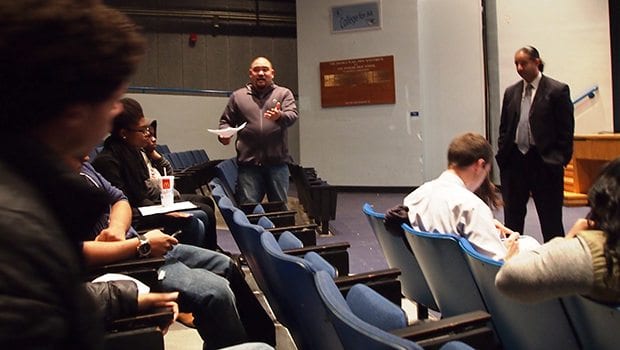School officials, students and parents weigh pepper spray for school police

The unarmed Boston Public School Police responsible for keeping students, teachers and staff safe in the city’s schools are asking city officials to arm them with pepper spray, saying they need the non-lethal agent to better do their jobs.
But students, parents and city councilors who turned out to meetings last week are cautioning that arming the officers with the chemical agents could cause more harm than good.
During a meeting at English High School last week, Boston School Police officials acknowledged that crime has declined in the schools. In the last year there were 152 school arrests, down from 464 in the 2007-2008 school year.
“If we are already able to keep the peace without pepper spray, why do we want to introduce it now?” questioned at-large City Councilor Ayanna Pressley.
In making the case for pepper spray, school police officials related a recent incident where an officer was beaten by two men who had entered the Jeremiah E. Burke High School.
“He was bruised up pretty bad,” said Boston School Police officer Kathleen Springer.
There are 75 school police officers responsible for maintaining safety in the city’s 46 high and middle schools, as well as at sporting events and other after school activities. The officers have arrest powers and carry handcuffs are radios that enable them to communicate with each other as well as with Boston Police Dept. officers.
While the number of arrests is down, Boston School Police Chief Bill Kelly said his officers stay busy.
“In a normal school year, we can have up to 400 incidents,” Kelly said. “It can be something as simple as a fire alarm. We have assaults, we have fights, we have drugs, we have weapons.”
The students in the auditorium at English High School questioned both the proposal to use pepper spray and the process by which the school department is soliciting opinions.
“The conversation is being framed as what should the policy look like, rather than whether we should have pepper spray,” one student complained.
Pepper spray is the common name for oleoresin capsicum, an agent that is usually sprayed in a person’s eyes, inducing tearing and temporary blindness. Police use pepper spray as a non-lethal means to subdue suspects.
But Lawyers Committee for Civil Rights Attorney Matt Cregor noted that pepper spray can be fatal in some cases.
“We know pepper spray can be lethal, especially with youth who have asthma,” he said. “African American youths are 24 percent more likely to have asthma than other youths. I am concerned that in a confined space, like a hallway, if you spray one kid, you’ve sprayed five.”
Sung-Joon Pai, a teacher at Charlestown High School, pointed to a 2006 incident where a 15-year-old was arrested at the Thomas A. Edison Middle School in Brighton after he detonated a canister of pepper spray there, forcing the school to evacuate. While there were no serious injuries, a teacher and 41 students were sent to area hospitals for treatment as a result of the discharge.
“I don’t see incidents where having pepper spray would have protected an officer,” Pai said.
School department officials will hold at least two more public meetings on the matter, according to BPS spokesman Lee McGuire. One meeting will be Thursday, Nov. 6 at 8 p.m. at the Hyde Park Education Complex. The next will be Nov. 13 at 6 p.m. at the West Roxbury Education Complex.
The Boston School Committee was due to be briefed on the issue at this week’s meeting Wednesday. A working group of parents, teachers and safety experts will be convened to assess the pros and cons of the issue.
There is no timeline for a decision, according to McGuire.
“This is the beginning of a very long process,” he said.







